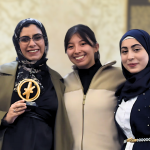Microbiology News Archive

Faculty of Science
How UM students aim to stop cholera outbreaks without any antibiotics
June 5, 2025 —
At the 2025 Science 3K Pitch Competition, Rana Ahmed presented the ground-breaking idea. She introduced combating cholera outbreaks in underrepresented nations by engineering probiotics. Being a waterborne disease, cholera can easily be transmitted. This is common, especially in places that suffer from crises, war and disasters. The current solution is through antibiotics. It is expensive, requires a doctor’s prescription and affects the immune system negatively.

Faculty of Science
Caring for future generations through collaborations between Indigenous communities and researchers
May 23, 2025 —
PrairieDNA is one of the 12 new projects co-funded by Genome Canada and regional Genome Centres to build Canada’s eDNA surveillance capacity across regions.

Faculty of Science
Back by popular demand: Science Rendezvous 2025
May 7, 2025 —
Get ready for Manitoba’s largest hands-on science and engineering festival. Join us on Saturday, May 10, from 11 a.m. to 3 p.m. right here in Winnipeg, at the University of Manitoba, Fort Garry campus.

Faculty of Science
CBC Manitoba: U of M student awarded for new cholera treatment idea
April 24, 2025 —
U of M student awarded for new cholera treatment idea

Sustainability
Sustainability award winners announced!
April 17, 2025 —
An exceptional group of students, staff and faculty were recognized with 2025 UM Sustainability Awards.

Research and International
The Free Press: Saving lives with Manitoba-made vaccines
April 15, 2025 —
Future vaccine development through research at UM

Faculty of Science
GraphBAN: making drug discovery faster and more affordable through Artificial Intelligence (AI)
April 14, 2025 —
UM researchers have developed a deep learning model to predict compound protein interactions. GraphBAN is an inductive graph-based approach. The model is all about discovering new drug candidates in the pre-clinical stage. This means speeding up the drug discovery process and making it more affordable.

Faculty of Science
UM students discover a new protein while investigating the question: “Why does Streptococcus make you sick?”
February 7, 2025 —
Strep throat, something we’ve all had at some point in our lives, is caused by the bacteria Streptococcus pyogenes. Infection by Streptococcus can be fatal in serious cases and is the leading cause of death among flesh-eating diseases resulting in over half a million deaths annually. That scratchy, sore feeling at the back of your throat is a result of Streptococcus pyogenes infected by viruses called bacteriophages. These “phages” carry the genes for toxins that are responsible for strep throat, and when they invade Streptococcus pyogenes, they transfer these genes, enhancing the bacterium’s ability to cause infection.

Faculty of Science
Volunteer with Science Rendezvous 2025
January 10, 2025 —
Science Rendezvous 2025 volunteer applications are now open!

Faculty of Science
UM Scientists’ recent discovery opens up possibilities for developing a new antibiotic through AI
December 11, 2024 —
Dr. ASM Zisanur Rahman, Julieta Novomisky Nechcoff, and Dr. Silvia T. Cardona have recently published their article, "Rationally designed pooled CRISPRi-seq uncovers an inhibitor of bacterial peptidyl-tRNA hydrolase" in Cell Reports. In this study, the team created a collection of bacterial mutants to help them understand how a new type of antimicrobial molecule, discovered with their artificial intelligence tools, stops bacteria from growing. Their research has now identified a unique combination of a compound and its bacterial target, opening up exciting possibilities for developing a new antibiotic. In this interview, we talk with Cardona, a professor and associate head graduate in the Department of Microbiology and an expert in antibiotic discovery to provide a deeper understanding of her research and recent work.






